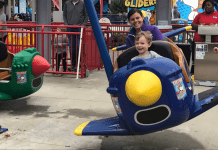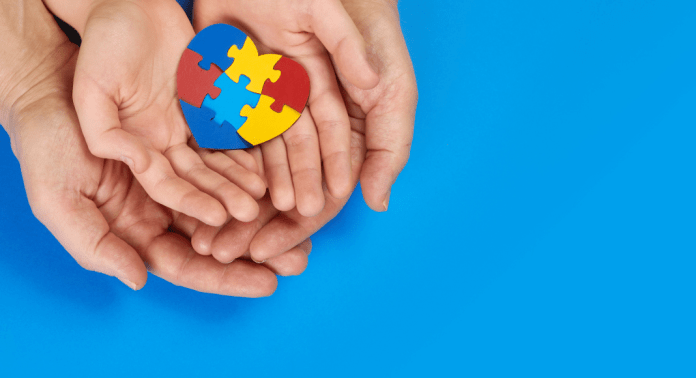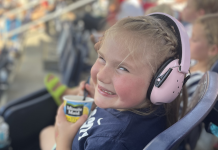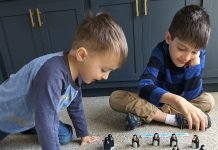The month of April is Autism Acceptance Month, a month that may or may not have even been on my radar until July of 2016, when my second son was born. Before then, I knew of autism vaguely — it was a label that belonged to other people’s children: an acquaintance’s child, a neighbor down the street, the young man who bagged groceries at my local grocery store. I was sympathetic, yes, but not invested. It hadn’t truly touched my world.
As I watched my second child grow up, I noticed small things, things that I swore he would grow out of. He needed intense physical therapy as a baby to even hold up his head, occupational therapy for helping him reach basic milestones, and later, speech therapy. Despite assurances that our child was merely delayed and would catch up, it was not until around age 2 that the hard won gains that he had made slowly faded away. The child who could at least mutter “I wanna watch toy trains” struggled to form a single word or syllable.
When we received the inevitable diagnosis at age 3 years old, we were stunned to find that he had the cognitive, developmental, and especially language skills of a 12-18 month-old child. Our emotions ran from fury (how did no one in his support team catch this?) to confusion (how would we ever help him function in a world not tailored for who he is?), to fear (how we will succeed? How will others treat him? Would he be bullied or be accepted by his peers?)
Four years later, I wish I could say that I’ve made peace with all these questions. While taking the next several years and investing every moment in therapies and opportunities to help my child’s development, I learned so much about autism as a whole.
Here are some crucial facts to know about autism
- The CDC estimates that 1 in 36 children in the US are diagnosed with autism spectrum disorder (ASD), with boys 4 times more likely than girls to be diagnosed.
- Autism is a behavioral diagnosis, not a medical one. This means that there are no medical tests to determine if a child is autistic, despite the fact that genetics seem to play a large role and many children with specific genetic markers are more likely to have autism.
- An estimated 25-30 percent of people with autism are nonverbal or minimally verbal. In addition, 31 percent have severe intellectual disability that causes them to struggle to perform basic daily functions, such as learning basic concepts, and performing basic adaptive skills such as dressing oneself, toileting, or engaging in social activity.
- Finally, autistic populations are far more likely to struggle with additional health issues such as anxiety, depression, gastrointestinal issues, epilepsy, and sleep issues.
Source: Autism Speaks
In recent years, April has changed from Autism Awareness Month to Autism Acceptance Month, which might seem to be just a simple change in wording. But to the autism community, it is everything. “Awareness” lets people know that something exists, but “acceptance” begs the question, now that we are aware, what are we going to do about it? Whether or not most people realize it, we all in live in a world that is built for neurotypical individuals, people who can tolerate physically and emotionally complex situations, loud noises and lights, crowds, or even are expected to express their emotions in socially acceptable ways, such as typical words or gestures — certainly not the glee that comes when my my child yells out, spins, or flaps his hands.
Our world is changing, and as I have gone on this journey with my child, I have been able to witness first hand how our Kansas City community has provided excellent opportunities for support and growth, such as community programs and sensory friendly times at local businesses for autistic and special needs communities to experience fun experiences without the overwhelming crowds. We can always do more, but it’s a beginning, and it is my hope that with growing acceptance and momentum, we can perhaps build a world that is inclusive of all physical and neurological types, including my precious, kind-hearted, incredibly exceptional boy.
Ways to Participate in Autism Acceptance Month
Spring Fling Open House
April 19, 4:30-6:30 p.m.
A free family friendly event featuring Art, Tye-Dye T-Shirt Making, Karaoke, and heavy Hors’de-vours at the Sherwood Autism Center. Learn more.
Autism Society of the Heartland 5K/1K Fun Run and Resource Fair
April 29 at Worlds of Fun. Learn more.
Family Autism Day
April 23, 2 p.m.
A pickleball event in an autism friendly environment for autistic persons and their families. Sign up for a free, 30-minute minute court reservation at Chicken n Pickle – Overland Park. Learn more.


















Hello Rachael,
Loved your article. As an Antibullying Consultant and former teacher, I have witnessed bullying. Children tend to bully those who are different. Our organization Bullying Halt the Behavior Consultants Inc, teach that ALL children are worthy of Respect, Dignity and Kindness.
Would love to help, donate in some way to Autism Awareness Month. If interested please contact me at 816-363-8191 or [email protected]. Thank you.
Carmelita Clark/Founder-CEO